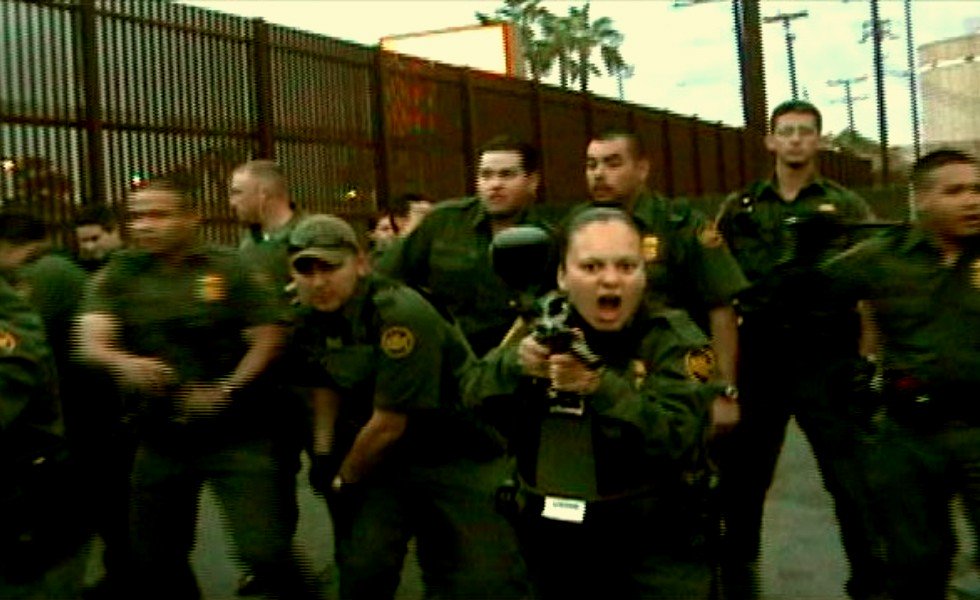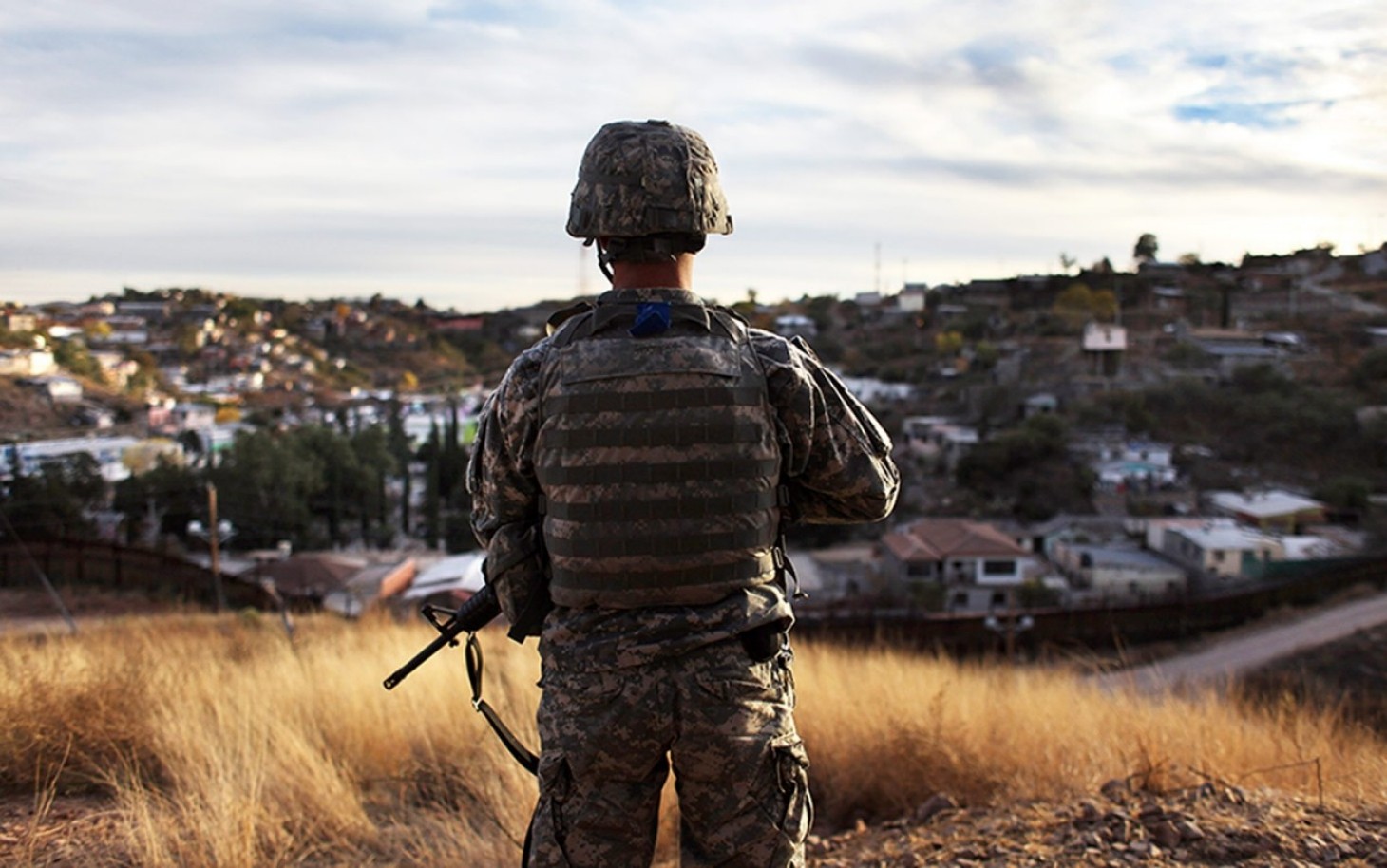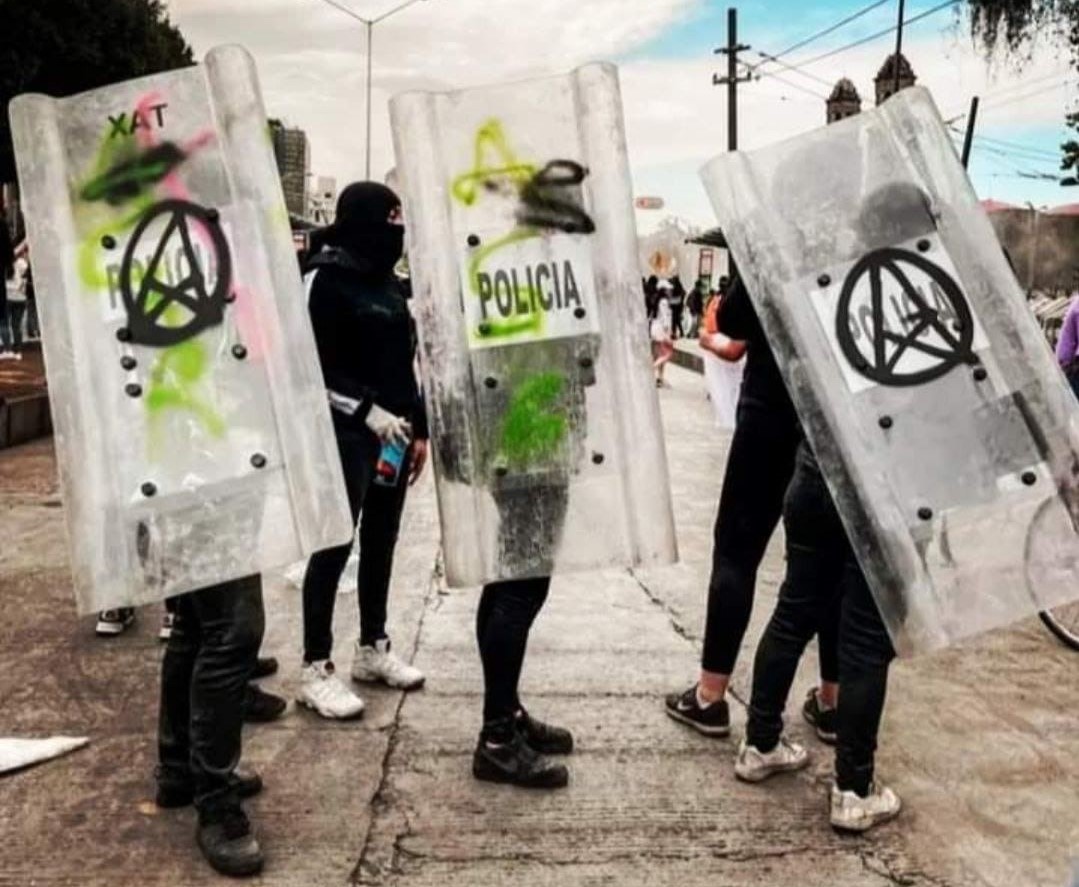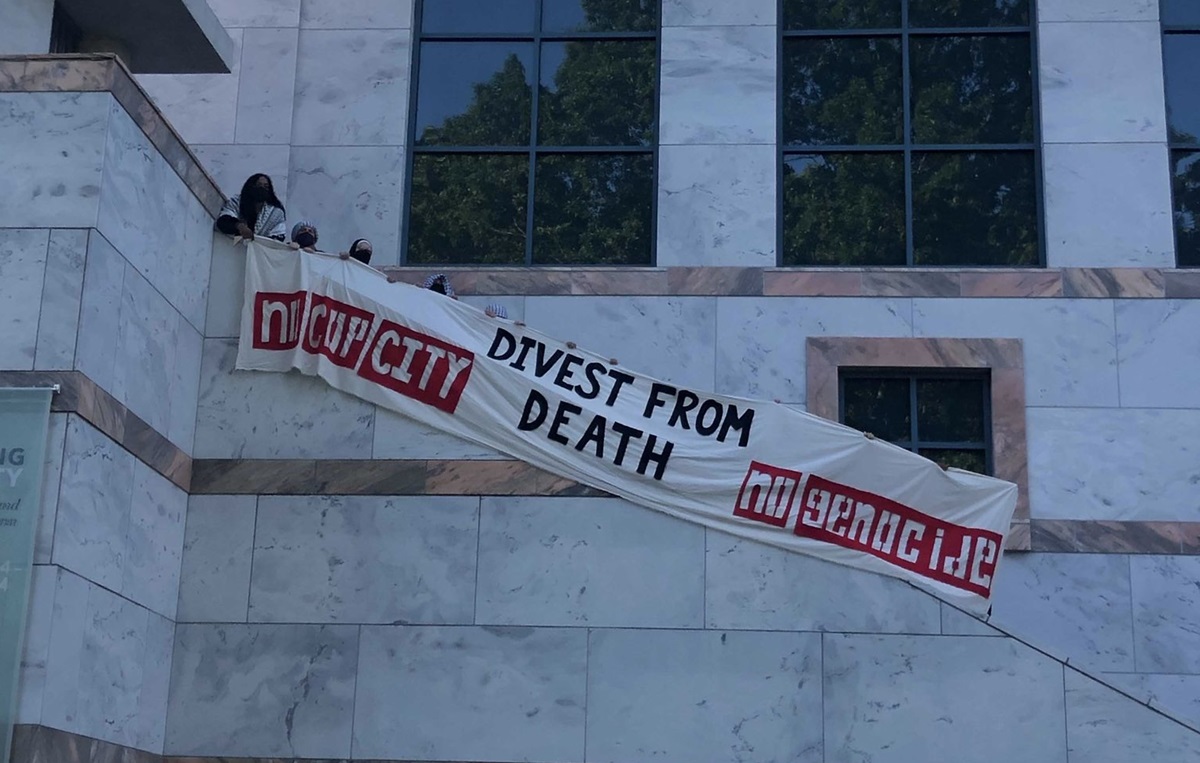Filed under: Borderlands, Editorials, Featured, Immigration, Repression, The State, US, White Supremacy

It is the intention of this ongoing column to highlight issues, points of reference, lessons and possibilities gleaned from the years we’ve spent in the borderlands resisting occupation, incarceration, and deportation. All linked articles and organizations are for context and further reference and do not imply affiliation or affinity with the author.
In the Borderlands
Things in the borderlands have been heartbreaking for a very long time. Though even here where we are, in some ways, accustomed to death, we see that things are heading towards an even darker place. The sinister gifts of the borderlands: police deputization to check immigration, information sharing between the local, state and federal systems, criminalization of undocumented communities, impunity to kill, raids: are being visited upon communities further inland than before.
criminalization of undocumented communities, impunity to kill, raids: are being visited upon communities further inland than before.
In the recent months I have felt, like many of my friends, sick and exhausted by the current political climate and unsure when considering the monumental tasks ahead. I have spent days between shift work frittering away precious hours obsessively reading the news. I have had trouble finding words to express the anger and nausea I feel. The immigration raids nationally have struck pure terror into so many hearts. The regional climate is not much better, with police brutalizing protestors at immigrant rights marches.
The current administration is using shock and awe tactics to overwhelm us with such a dizzying array of executive orders that it is hard to keep track of everything that is happening, much less begin to respond to it. One could spend endless pages delving into the implications of the new travel ban and speculating as to where this will all end. In the face of such explicit racism, paralyzing depression makes sense, but there is too much at stake to give into it.
The entire mainstream media has become engaged as a pop psychologist for the President. Opinion pieces about his aberrant behavior distract us from the very real consequences of his policies. It is a bow to cynical populism to focus too much on Trump as a person. We cannot simply call him a fascist, amp up our rhetoric and hope others will heed our call to action. A waterfall of propaganda cannot replace analysis and reflection. In our haste to respond we sometimes try and match the pace of terror within capitalism and we lose both momentum and perspective. While we don’t have a lot of time, we have enough to take a deep breath and consider our options.
This will require more nuances and a contemplative approach. It is time to resist specific strategies of enforcement, and build alliances based on shared goals – not necessarily on shared ideology.
Resisting Trumps’ policies will require dedication, research, and cross-cultural cooperation between wide arrays of alliances. This may be our moment as anarchists- we’ve been right about a lot of the ways the mask of humane governance is falling apart these last few years. It’s a terrible thing to be right about, the worst kind of vindication, and we can’t resist it alone. What are we going to do about it? We cannot hold so firmly to the alienated affects of years past or indulge in mistrust of others, we need other people to join with, and to join us, in resistance.
Anarchists have an astute critical eye for hypocrisy, but focusing on political purity comes at a cost. We love calling people liberals and endlessly discussing who is co-opting our struggles. Except the fight against borders isn’t our struggle alone. We will not be the primary authors of this resistance. Just as new relationships have been forged in the uprisings against police brutality, the time is ripe for new connections in the fight against the internalization of the border. This will require more nuances and a contemplative approach. It is time to resist specific strategies of enforcement, and build alliances based on shared goals – not necessarily on shared ideology.
Trump in the House Obama Built
We will need better intelligence on our enemies. Let’s begin with a short review of what we do know. The commodification of entire communities as fodder for private prisons is not a new trend.
We will need better intelligence on our enemies. Let’s begin with a short review of what we do know. The commodification of entire communities as fodder for private prisons is not a new trend. The last decade has been a hard one. Trump inherited much of the infrastructure necessary for mass deportations from Obama. There has been a shift from civil to criminal code in dealing with immigration. Categories of criminality developed under Obama are shifting in ways which do not bode well.
The parsing of immigration enforcement between deserving and undeserving categories, which was so troubling during Obama, is now amping up under Trump.
Illegal Reentry has consistently been one of the top federally prosecuted crimes. Sifting through the minutiae of legal policy is daunting. If you don’t have time, or inclination, to watch government sentencing guideline videos (Illegal Reentry Guideline Briefing) I will summarize for you.
Immigration offences make up a large amount (30% in 2015) of federal caseload. The criminal justice system relies on coerced pleas to lessen that burden. If every case went to trial the system would be crippled. Immigration is no exception to this, as it relies heavily on fast-track programs that offer lower sentencing for early guilty pleas. Charges like illegal reentry (you got taken into custody after being caught and deported in the past) and identity theft (you used or made up a Social Security # in order to work) provide the legal precedent to deport whomever they please.
The legal precedent for mass deportation already exists, but the physical infrastructure for holding and processing will need to be expanded if Trump is to keep his horrific, and absurd, campaign promises.
Models for expedited trials, like Operation Streamline already exist. Operation Streamline takes people apprehended crossing, charges then with misdemeanors or felonies and sentences people in same day trials to serve time in for-profit private prisons before repatriation. If these forgone conclusions seem depressing, apparently we should feel thankful it involves a day in court at all. Not everyone gets to see a judge before they are deported. Stipulated removal processes have been deporting people without an immigration hearing for well over a decade.
The legal precedent for mass deportation already exists, but the physical infrastructure for holding and processing will need to be expanded if Trump is to keep his horrific, and absurd, campaign promises. This is not a fundamental change in the way that immigration offences are dealt with – Trump is simply getting ready to use criminalization against a wider category of people. The net is getting wider.
In order to do that the current backlog of caseload must be dealt with. There is federal hiring freeze, but it doesn’t apply to immigration judges. The next executive order may see the already horrifying expansion of family detention made even more traumatic than it already is by automatically separating minors from their parents.
The federal government has been preparing, and will continue to expand, the judicial grounds from which to deport those we love. Even previous recipients of exceptions like DACA, which offered temporary reprieve for people brought here as children, are not safe. In Mississippi, Daniela Vargas, a DREAMER activist was taken into custody and is fighting deportation potentially any day now and without a hearing, after she spoke out about the detention of her family members. In Denver, Jeanette Vizguerra has taken sanctuary in a church to avoid being deported. The ostensive legal issue that makes her a priority for removal? Making up a social security number to work with.
The next executive order may see the already horrifying expansion of family detention made even more traumatic than it already is by automatically separating minors from their parents.
How then can the government say they are only going to deport criminals when being undocumented has itself been made a crime? By the dictates of this administration, people will become de-facto criminals simply through their existence.
The government doesn’t have the prison cells, transport space or temporary holdings, to deport the numbers they claim they want to deport. They also don’t have the enough officers to enforce. But consider that the deportations may not come as horrific swells. They may take people as they take young men in communities of color into prison, one by one. There haven’t been mass raid where I live, because they don’t need mass raids where I live. They have spent the last 15 years carefully building the infrastructure to deport people so seamlessly, so consistently and so smoothly that half the damn town doesn’t even think about it anymore, (fuck those people incidentally). It’s a horrible thing to be used to.
The Border Patrol and ICE – they need the cops to do this. How the dictates of these unfolding mandates actually affect our communities will depends on how police and federal agencies do, or don’t, work together. In order to resist the internal expansion of the border, and Trump’s looming enforcement regime, we must understand these alliances at an exhaustingly provincial level.
The Details in the Devil
We cannot afford the broad-brush euphemisms that sometimes character our political discussion about the institutions we despise. It is not enough to say ‘Fuck the Police.’ We must do our research.
We cannot afford the broad-brush euphemisms that sometimes character our political discussion about the institutions we despise. It is not enough to say ‘Fuck the Police.’ We must do our research. Are the police in your town bound by 287g agreements that deputize them to check immigration?
Currently, ICE has 287(g) agreements with 37 law enforcement agencies in 16 states. ICE has trained and certified more than 1,822 state and local officers to enforce immigration law.
Did you state end up with an SB 1070 copycat law that also deputizes the police? How did they deal with the fall out? What steps back from those policies did they make over the last few years? Are they more emboldened now? Did your municipality participate in Secure Communities, which checks immigration status of those in local or state custody?
Under Secure Communities, the FBI automatically sends the fingerprints to ICE to check against its immigration databases. If these checks reveal that an individual is unlawfully present in the United States or otherwise removable due to a criminal conviction, ICE takes enforcement action. Further still, did your municipality participate in the Priority Enforcement Program (PEP) that replaced Secure Communities in July 2015?
If your head is spinning right now, it should be. This shit is really complex. I think part of the deep fear and exhaustion that we are experiencing right now is no one is really sure how this all going to shake out.
We should not lump all potential executors of immigration policies together. We must take the time to understand the overarching picture by studying the political landscape onto which these policies will be implemented. This is sometimes tedious and requires following political developments at a level once reserved for those participating in local elections. I am not saying we should vote, I am saying we’ve got to pay closer attention. There are different factions within the local, state and federal government vying for widely different visions of enforcement. The devil is very much in the details.
Large-scale raids based, I think, on making a point about sanctuary cities have occurred. The mayor of Austin , TX was not thrilled. The county commissioner in Multnomah County , Oregon doesn’t want federal officers conducting sweeps in the courthouse. Ostensibly, the LAPD doesn’t want to deputize. Border Patrol and police in Tucson, AZ are having a tiff about why police cooperation was pulled during a recent manhunt. What do these individual incidents mean? Nothing, yet. It’s the whole picture we need to keep track of.
Within 100 miles of the borderline Border Patrol have always had discretion to do whatever the hell they please. Cops collusion with BP is well documented. The question is… in what manner are they and will they enforce where you live? How will the cops work with ICE?
Dropping your kids off at school isn’t safe in Los Angeles, CA. The traffic stop that used to only lead to deportation in the borderlands… that traffic stop could happen potentially everywhere now. So should we, as anarchists, care what line the municipal police forces take in this? Do we have a stake in the bullshit rhetoric of community policing? Yes sadly we do, because fuck community policing, but it affects how the cops, BP and ICE engage with one another.
Moving Forward, Building Defense and Capacity
Communiqués romanticizing confrontational tactics over legal rights trainings feed into false dualisms and miss the point.
What is a sanctuary city? Is the city you live in a sanctuary city? Do sanctuary cities even matter if any label of criminality is sufficient to justify being taken into custody? It’s a hard question, but you’d have to be a real cynic to say it doesn’t matter. Every person deported means one more person trying to cross the desert where many have perished…
I think any, and all, strategies that can slow or impede border enforcement are important. Communiqués romanticizing confrontational tactics over legal rights trainings feed into false dualisms and miss the point. Confrontational tactics definitely give the local police pause when enforcing immigration laws. When we resisted SB-1070 hard, it changed the ways that the police engaged in enforcement. But, wilding out isn’t the only way to resist.
I have watched a lot of people I love climb under police and BP vehicles trying to stop deportations, with mixed results. When it works, it works in tandem with a damn good immigration and criminal lawyer. Furthermore, the potentially lethal consequences of confrontations with the state cannot be understated if we mean to engage in serious resistance. Cops and BP have immunity to kill and we shouldn’t have false bravado about that. We need a true diversity of tactics that embrace a variety of vulnerabilities and strengths. We should be encouraging any and all activities that reduce the fear that has gripped us.
If ICE comes for you, or your loved one, and you throw down, I will support you. But there are a lot of things that can be done before that point to prepare. Community-based know your rights trainings, when pared with legal clinics and connections to lawyers, can help people feel safer. People need to feel supported in order to go about their daily lives, in order to survive. It’s not very sexy to do paralegal work but I am glad we all agree that guardianship paperwork is important to fill out so that people’s kids don’t end up in CPS custody if they get deported.
Taking a hard line against community organizers, or NGOs, makes no sense in a political climate where immigration and amnesty cases can take years to work through and bail bonds are high. Expedited removal is a very real threat. It is important to acknowledge how much the game is changing for people in the interior right now. But, not every case will go that route.
We have to be ready for repression, legal cases, and wounded comrades. Getting some down lawyers and medical providers lined up isn’t liberal – its strategic.
Refusing to partner with legal observers and lawyers makes no sense in a climate where people who organize in solidarity with immigrants will also find themselves criminalized. We need to build capacity to deal with the consequences of our rhetoric! I don’t say that as a damper, but this shit is really real. We have to be ready for repression, legal cases, and wounded comrades. Getting some down lawyers and medical providers lined up isn’t liberal – it’s strategic.
There is a lot we can do right now. Community defense networks help families pool resources for bail. Rapid response systems have a lot of potential to get people on the ground when things are happening, but are only as effective as the number of people you can network with.
We need to really challenge ourselves as anarchists – culturally, linguistically, and personally. Communities of faith in LA are building safe houses and creating underground networks. Whether or not the legal definition of sanctuary holds up, and pessimistically I think it might not… radical communities of faith have so much to offer in resistance!
This needs to be an expansive, not a reactive, time for us.
Anarchists also have a lot of really applicable skills in struggle. We have expansive understandings of history. We are great paralegals, builders and healers. We understand government repression intimately. We are versatile, dedicated and flexible. We bring a lot to the table! Let’s share with others and have an exchange about tactics and strategies as we fight together, instead of limiting who we collaborate with based on assumptive judgments. This needs to be an expansive, not a reactive, time for us.
This needs to be an expansive, not a reactive, time for us.
We’ve been resisting the enforcement regime a long time here… one of the main things I have learned is that there is no singular strategy or tactic that will work for every person, place or community.
If you are wondering whether or not to participate in a local response to Trump’s immigration crackdown, ask yourself: is the concrete outcome of this project in keeping with my beliefs? Does this help resist the border regime? If the answer is yes, then fucking do it! Deal with the ideological differences you encounter in the course of the work as they come.
What we are up against requires heart, graciousness, tenacity and compassion, as well as focused rage. I may not always have it in me to get out of bed in the morning, but damn it, I know we have a collective capacity to resist, to survive and to find each other in dark times. I believe in us. We are not defeated because we are not dead yet. Moving forward, I hope we can be both brave, and humble, in our endeavors. So until all borders crumble… good luck compas!
Further Reading
For a contemporary overview of the borderlands read about the intent of border policy in Designed to Kill and the internal expansion of the border in The Insurgent Southwest. For an interesting timeline of organizing see Pronet’s history of resistance.












